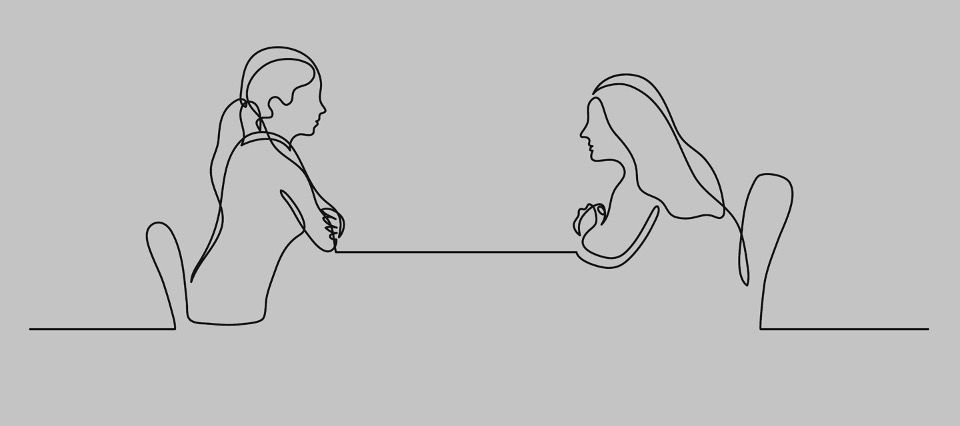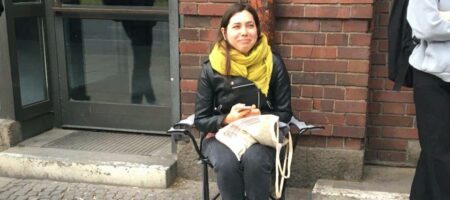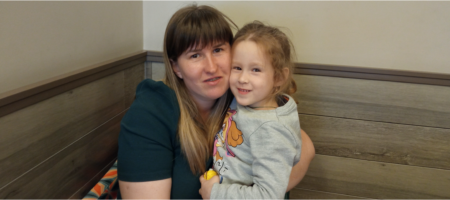We lived in Kryvyi Rih…
Anna, who has asked us to use this name as an alias, can’t go on talking because she is crying. Her life was well set-up in Ukraine. She is happily married and has a young daughter aged one year and ten months. Ann had just returned to work from maternity leave and was in the first weeks of working in a new job. She had found a good nursery for her daughter who was adapting to it very well. Anna’s husband was a huge support for the family and also had a good job.
Everything was going well in our life.
Anna is a nurse and had just started working in a COVID ward at the hospital. It promised a salary that was increased from her last job; but she’ll not receive any of the money now.
It was hard work there; always many sick people and a lot to do.
Anna was at work when the war started. Immediately, she was contacted by her daughter’s nursery, which was closing. Anna had to pick up her daughter straight away. They still hoped that the disruption wouldn’t be that serious and that, within reason, they could carry on with their normal lives. Anna and her husband took their daughter to Anna’s mother-in-law and the pair returned to work.
When the air raids began, Anna and her colleagues had to take the patients down to the shelter. Once it stopped, the patients had to be transferred to their rooms again. Being moved so often – at least several times each day – was very painful for them.
My patients were saying that they would rather die in their hospital rooms than be in so much pain down in the shelter.
Anna and her husband, in the following days, we becoming increasingly frightened because of the bombings near the city and all that they were seeing on the news. The situation felt really unpredictable.
We didn’t want to believe that real war could start. The thought of moving out of the country didn’t even present itself.
When Russia attacked the atomic station in the nearby town of Enerhodar, they took the decision to leave.
My friend’s brother, who lived in this town, called me and said the situation was really dangerous and I should run away.
This was an incredibly frightening moment for Anna. She called her husband and told him it was time to leave, but she didn’t want to leave her home.
I was pressed by a strong fear.
That evening, all the family went to the railway station so that Anna and her daughter could take the evacuation train. But the station was so overcrowded that they were unable to even enter the building. They decided to travel by minibus along with eight other women and their small children. This was when Anna said goodbye to her husband, who has stayed behind to help protect the territory.
The driver of the bus was taking many detours, trying to avoid the most dangerous places.
I don’t remember the places we travelled through. Our driver was confused and didn’t know which route would be safest.
Anna is crying while remembering the journey. The journey should have taken one day, but they travelled for three. It felt like hell. It was very hard to get any sleep. The driver was taking short breaks of 1-2 hours so he could try to sleep, but the children were crying and screaming all the time.
We only took food for one day. It was scary to realise that we didn’t have enough food for the children. We stopped at gas stations but almost everything was already gone. I remember how happy I was to be able to find noodles at one of the stations.
The mini bus travelled through Uman, Vinnytsia and many small villages. The bus crossed the border at Zolochev into Eastern Poland. It took about five hours to get through because of all the necessary checking of documents. There were many Ukrainian volunteers taking people from the border to their places in Poland. It was freezing cold and a relief to find warmth in a shelter at the border, where volunteers met them with rations. Anna’s daughter was able to drink some milk, which was about all that was left.
Anna remembers how Polish families, who were strangers, were there to greet Ukrainians coming through. They had brought supplies and presented Anna’s daughter with a toy tiger. Many Polish people were crying and hugging the refugees from Ukraine as if they were members of their own family.
Anna and the women who had travelled together in the mini bus decided to try to book a house to rent together. They found somewhere that seemed suitable in Bielsko- Biała and booked it, then turned their attention to trying to find transportation. Anna went inside for moment to warm up and sat on the floor. She fell asleep, powerless with fatigue, but rallied herself after around 40 minutes to help with seeking transport again.
The children were very exhausted. It was impossible to calm them down. They were just laying on the ground and screaming in their dirty clothes.
Finally, a car said that it could take them to Kraków, but then the house the women had booked fell through; their booking was cancelled.
I didn’t have the energy to cry anymore.
Fortunately, a friend of Anna’s lives in Bielsko- Biała and invited her to stay for a couple of days, so Anna arranged to travel there with her daughter and without the other women who had shared her journey so far. Whilst she was saying with her friend, she continued to search for another place. Eventually, she was offered a wooden cabin in a tourist camp in Ustroń. The camp had been closed for two years, but the owner has opened it for refugees who need somewhere to shelter. The houses are cold, but there is no rent to pay. Anna is glad to have a roof over their heads.
Volunteers come with the most essential supplies and the owner of the camp also delivers food every few days. They are able to go to a nearby supermarket and there is also a centre set-up to help Ukrainian’s, too – although often, by the time it is Anna’s time to visit, the shelves are mostly empty.
The first few days were incredibly hard. Anna worried about how she would find work with a small child; all the local nurseries were already full to capacity. However, a few days later, Anna’s cousin joined her and now they are together, Anna also has some support with her daughter. She hopes that she will be able to find work – at least part-time.
First days were hard the young woman was anxious about how to find work with a small child, all the local kindergartens were already full. In a few days her cousin joined her. Now they stay together and she has some support with the baby. There is a hope she will be able to work at least part-time.
Anna’s cousin, Maria, was staying at students accommodation in Kyiv when the war began and she started to hear bombs falling. She is 22 years old and also has two younger brothers; the three siblings live together without parents and Maria had the responsibility of taking care of them.
My roommates and I didn’t want to believe that a war could start, but then the windows began to buzz because of the explosions.
Maria and her friends started to quickly pack their belongings and grabbed food from the fridge. They ran to the nearest bus station, but at the tickets were already sold out; there was no room for them.
I was crying and begging the driver to take us at least somewhere outside of the city. He allowed us inside with the condition that we would have to get off if the police stopped the bus.
The bus was a large double-decker and the feeling that it could be shot at, at any moment, didn’t leave them while they were travelling through the city.
They arrived in a small town near Odessa, where Maria’s friend lived. All the trains from Odessa were cancelled so there was no opportunity to go anywhere else. Maria stayed with the friend’s family for 28 days. Throughout this time there was bombing in the area and frequent air raids. She was frantic with worry about her two brothers, but there was no way to reach them. During this time, Maria’s cousin, Anna, phoned her and urged her to travel to Poland where it was much safer.
As soon as it was possible, Maria bought a bus ticket to Kraków – but the driver changed the route without any warning and Maria arrived at an unknown place without any connection on her phone. She was able to find her way to the trolleybus, which took her to the railway station in Kraków. There, some Polish volunteers helped her to get on to the train to Katowice, which is free for people from Ukraine. Anna booked Maria a taxi from Katowice to Ustroń. Maria was finally able to join her cousin and they are supporting one another.
Maria’s brothers are at home in Ukraine. She is in touch with them, but very worried; there are often attacks very near to them and the situation is very unstable.
I feel awful, like I am betraying my brothers by leaving them there alone.
Maria was given a laptop by a Polish family, so she can finish her studies this year. The exams are very soon. But she is on medication to calm her and cries all the time. She can’t watch the news.
I will never forget what has been done to us.
Both women agree that it’s hard to know how much time it will take before some of the shock and stress they feel will start to subside.
Posted on April 7th, 2022
Voices Ukraine



